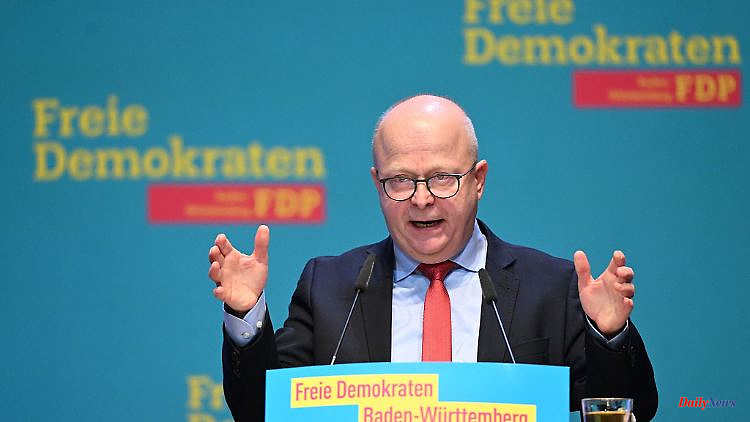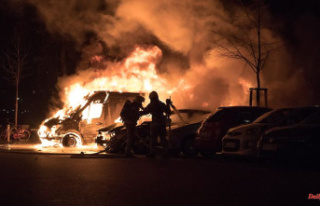The Südwest-FDP absolutely wanted to govern with Winfried Kretschmann after the state elections. But he chose the CDU. Now, almost two years later, the Liberals are giving the Greens an ultimatum: now is the last chance for a south-west traffic light.
Fellbach (dpa / lsw) - The FDP called on the Greens to break the coalition with the CDU and to form a south-west traffic light before the summer. "Leave this coalition, which is languishing like mildew anyway," said FDP state chairman Michael Theurer at the state party conference in Fellbach (Rems-Murr district) on Thursday. "We shouldn't waste another three years on this country." The Greens still have the opportunity to form a traffic light with the FDP. In the summer, however, this time window closes, said Theurer of the German Press Agency. Then time will be too short for an alliance of Greens, FDP and SPD in the southwest to make a name for itself and achieve success before the 2026 state elections.
The new edition of the green-black coalition in the state of Greens and CDU started on May 12, 2021. A traffic light for the Greens with SPD and FDP would also have been possible. But after the soundings, Prime Minister Winfried Kretschmann opted for coalition negotiations with the CDU, even though they had suffered heavy losses in the state elections.
If the Greens of the CDU continued to hold their own, Theurer threatened to do everything to vote out the green-black state government. As much as Theurer ensnared the Greens, he criticized the Union at federal and state level. The main target was CDU state leader and Interior Minister Thomas Strobl. The Liberals accuse him of not resigning despite the preliminary investigation because of a lawyer's letter that was passed on. "This minister is a declared security risk," said state faction leader Hans-Ulrich Rülke.
Around 400 delegates discussed the political course for the new year at the party conference. The central topic was the energy supply. Delegates approved a motion calling for the purchase of new fuel and the continued operation of the remaining three nuclear power plants until 2026. "In a reasonable energy mix, it makes sense and is necessary for the nuclear power plants that we have to keep running," said Theurer. Group leader Rülke said new fuel elements would have to be used for three years, making it necessary to operate nuclear power plants until 2026.
Due to the current energy crisis, the last three German nuclear power plants will run until April 15, 2023 according to the decision of the federal government. The liberals at federal and state level are insisting on longer running times. From the point of view of the operator EnBW, a longer operation of the Neckarwestheim 2 plant should have been decided long ago in order to be able to implement it technically.
Theurer and Rülke also called for investments in climate-neutral, synthetic fuels for combustion engines, so-called e-fuels, and criticized the decline of Baden-Württemberg in the state comparison in terms of education. Theurer complained that 20 percent of all fourth graders could not read and write properly. "We need a course correction of the unsuccessful green-black policy."
At the suggestion of the parliamentary group, the delegates passed a motion for an electoral law reform, according to which the number of constituencies in Baden-Württemberg and thus the number of MPs should be reduced in order to counteract "bloating in the state parliament". "Anyone who wants to save taxpayers' money cannot avoid reducing the number of constituencies," said parliamentary group leader Rülke. The FDP wants citizens to vote on this issue in a referendum if the reform proposal is rejected in parliament.
In addition to substantive applications, the FDP also dealt with changes to the statutes. With a large majority, the delegates decided against reducing the FDP party conference from 400 to 300 delegates. An initiative to establish dual leadership in the party also failed due to the necessary two-thirds majority, although many of the delegates voted in favor. "The debate about the optimal organizational structure will continue to occupy us as a party at all levels - as a state association we see ourselves as drivers of modernization within the FDP," said Theurer.












